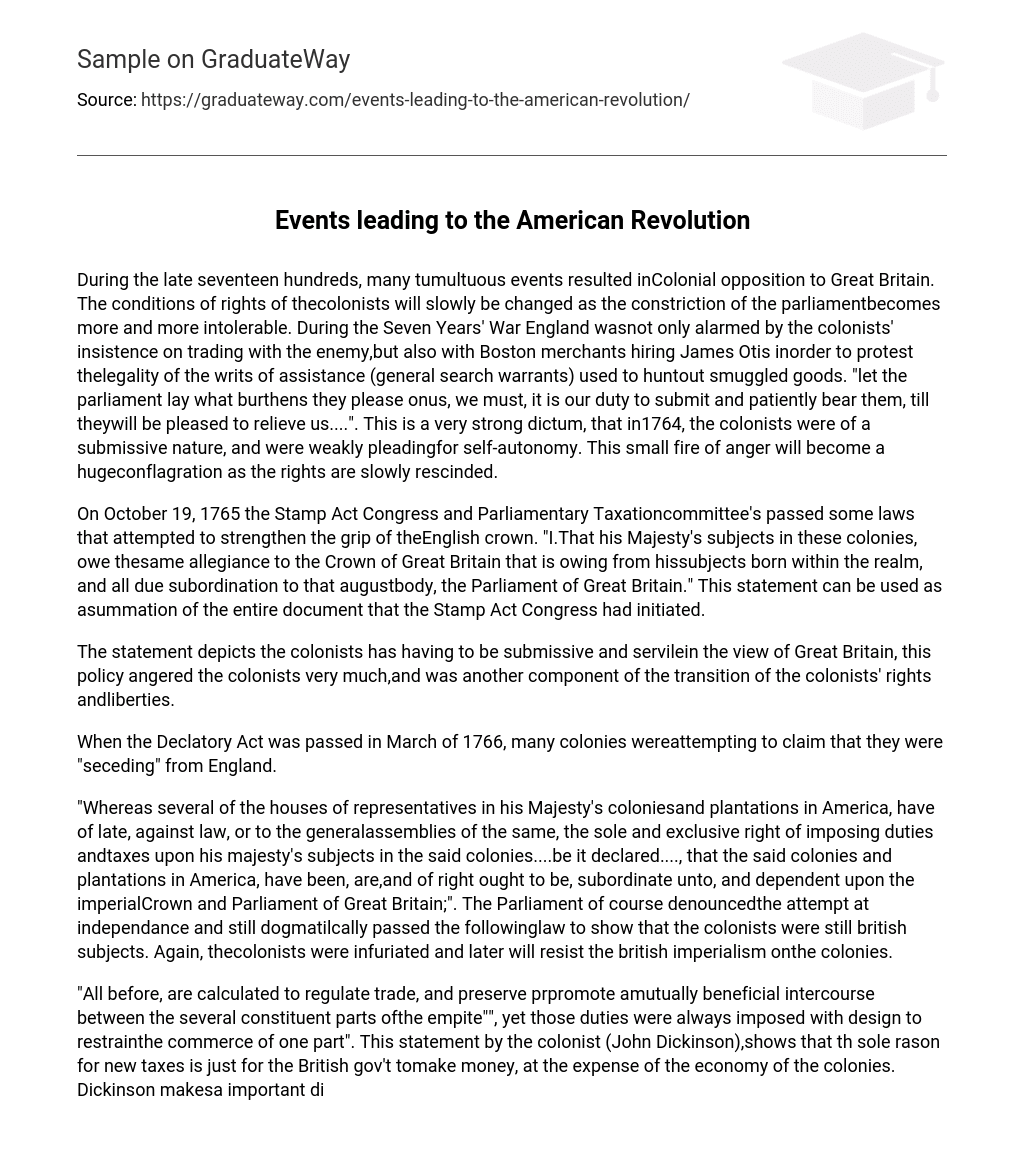During the late seventeen hundreds, many tumultuous events resulted inColonial opposition to Great Britain. The conditions of rights of thecolonists will slowly be changed as the constriction of the parliamentbecomes more and more intolerable. During the Seven Years’ War England wasnot only alarmed by the colonists’ insistence on trading with the enemy,but also with Boston merchants hiring James Otis inorder to protest thelegality of the writs of assistance (general search warrants) used to huntout smuggled goods. “let the parliament lay what burthens they please onus, we must, it is our duty to submit and patiently bear them, till theywill be pleased to relieve us….”. This is a very strong dictum, that in1764, the colonists were of a submissive nature, and were weakly pleadingfor self-autonomy. This small fire of anger will become a hugeconflagration as the rights are slowly rescinded.
On October 19, 1765 the Stamp Act Congress and Parliamentary Taxationcommittee’s passed some laws that attempted to strengthen the grip of theEnglish crown. “I.That his Majesty’s subjects in these colonies, owe thesame allegiance to the Crown of Great Britain that is owing from hissubjects born within the realm, and all due subordination to that augustbody, the Parliament of Great Britain.” This statement can be used as asummation of the entire document that the Stamp Act Congress had initiated.
The statement depicts the colonists has having to be submissive and servilein the view of Great Britain, this policy angered the colonists very much,and was another component of the transition of the colonists’ rights andliberties.
When the Declatory Act was passed in March of 1766, many colonies wereattempting to claim that they were “seceding” from England.
“Whereas several of the houses of representatives in his Majesty’s coloniesand plantations in America, have of late, against law, or to the generalassemblies of the same, the sole and exclusive right of imposing duties andtaxes upon his majesty’s subjects in the said colonies….be it declared…., that the said colonies and plantations in America, have been, are,and of right ought to be, subordinate unto, and dependent upon the imperialCrown and Parliament of Great Britain;”. The Parliament of course denouncedthe attempt at independance and still dogmatilcally passed the followinglaw to show that the colonists were still british subjects. Again, thecolonists were infuriated and later will resist the british imperialism onthe colonies.
“All before, are calculated to regulate trade, and preserve prpromote amutually beneficial intercourse between the several constituent parts ofthe empite””, yet those duties were always imposed with design to restrainthe commerce of one part”. This statement by the colonist (John Dickinson),shows that th sole rason for new taxes is just for the British gov’t tomake money, at the expense of the economy of the colonies. Dickinson makesa important distinction between the rights of the colonies and theauthority of the parliament. Dickinson’s comments were ubiquitous among thecolonists, and thus infuriated them to rebellion, and the seizure of basicdemocratic rights.
“From necessity of the case, and a regard to the mutual interest of bothcountries, we cheerfully consent to the operation of such acts of theBritish parliament as are bona fide restrained to the regulation of ourexternal commerce, for the purpose of securing the commercial advantages ofthe whole empire to the mother country , and the commercial benefits ofit’s respective members excluding every idea of taxation, internal orexternal, for raising a revenue on the subjects in America without theirconsent ….” The continental congress had presented it’s colonial rights.
These rights enable the colonies to be more autonomous with exception tothose several states who are under the british control. One importantelement of the document, is the idea of taxation without representation;the said that raising taxes without consent was illegal and that thecommercial benefits of the colony should be shared within the colonies,instead of England becoming more and more economically prosperous. Thewhole idea of mercantilism was about to be crushed, due to this idea, ofself-autonomy with respect to colonial economics.
“Ye that oppose independence now, ye know not what ye do, ye are opening adoor to eternal tyranny….”. This statement made by Thomas Paine shows theforeshadowing, of what colonists would do. The British are trying toprevent independence, and from doing so, they are being tyrannical. Again,the rights of the colonists are being questioned and rebellion shortly willbe forthcoming. “That whenever any form of Government becomes destructiveof these ends, it is the right of the people to alter or to abolish it, andto institute new government, laying it’s foundations on such principles andorganizing it’s powers in such form, as to them shall seem most likely toeffect their safety and happiness.”. What the declaration is really saying,is that a society who has no or little rights (such as the colonies) shouldbe destroyed, thus separation from England. A new society would follow,where the people of the society would have these rights necessary forself-autonomy. The Declaration of Independence was a strong justificationfor revolution.
The Revolution follows the Declaration of Independence, where atransition occurs. The transition has to do with the rights of thecolonists. The colonists acquire their rights through resistance to britishimperial conformity, by resisting certain policies detrimental to theinalienable rights of a democracy. The transitional period was from 1760’sto 1770’s. This is a crucial period of time, because this is where thecenter of power is transferred from the british government (Parliament) tothe colonial citizens. A major component to this center of power was therights of the colonists, the colonists gained their rights throughresistence to an imperial power. This transition is depicted through theprogression of time in the documents.





